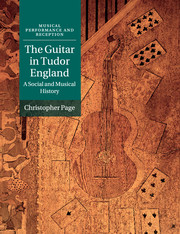Book contents
- Frontmatter
- Dedication
- Contents
- List of figures
- List of tables
- List of music examples
- Acknowledgments
- Note on music examples
- List of abbreviations
- Introduction
- 1 Imagery
- 2 Who owned a gittern?
- 3 The gittern trade
- 4 ‘An instruction to the Gitterne’
- 5 Sounding strings
- 6 The gittern and Tudor song
- 7 Thomas Whythorne: the autobiography of a Tudor guitarist
- Conclusion
- Appendix A The terms ‘gittern’ and ‘cittern’
- Appendix B References to gitterns from 1542 to 1605
- Appendix C The probate inventory of Dennys Bucke (1584)
- Appendix D Octave strings on the fourth and third course
- Appendix E The fiddle tunings of Jerome of Moravia, swept strings and the guitar
- Appendix F The mandore and the wire-strung gittern
- Appendix G The ethos of the guitar in sixteenth-century France
- Appendix H Raphe Bowle
- Bibliography
- Index
Appendix G - The ethos of the guitar in sixteenth-century France
Published online by Cambridge University Press: 05 June 2016
- Frontmatter
- Dedication
- Contents
- List of figures
- List of tables
- List of music examples
- Acknowledgments
- Note on music examples
- List of abbreviations
- Introduction
- 1 Imagery
- 2 Who owned a gittern?
- 3 The gittern trade
- 4 ‘An instruction to the Gitterne’
- 5 Sounding strings
- 6 The gittern and Tudor song
- 7 Thomas Whythorne: the autobiography of a Tudor guitarist
- Conclusion
- Appendix A The terms ‘gittern’ and ‘cittern’
- Appendix B References to gitterns from 1542 to 1605
- Appendix C The probate inventory of Dennys Bucke (1584)
- Appendix D Octave strings on the fourth and third course
- Appendix E The fiddle tunings of Jerome of Moravia, swept strings and the guitar
- Appendix F The mandore and the wire-strung gittern
- Appendix G The ethos of the guitar in sixteenth-century France
- Appendix H Raphe Bowle
- Bibliography
- Index
Summary
The gittern playing of sixteenth-century England was especially indebted to practice in France, and it is French sources of the period that reveal, with especial vividness, the kind of ethos for the renaissance guitar that we glimpse, here and there, through the words of Thomas Whythorne.
In a manner that Whythorne certainly does not care to acknowledge, guitars were widely associated in the sixteenth century with itinerant musicians, as revealed in a poem by the laureate Mellin de Saint-Gelais (1491–1558). This is the angry soliloquy of a guitarist whose serenade has failed. He is half frozen to death; the midnight bell rang some hours ago and the temperature has fallen. He can only remain staring at a closed wooden door:
Et quel grand Diable est cecy?
Veult-on que je couche icy?
Seray-je encores longtemps
En ce maigre passetemps?
Mynuict est pieça sonné.
Par Dieu, c'est bien promené.
Je fay bien de leur vallet,
D'icy trembler le grelet …
Adieu, belle, je m'en vois.
Par Dieu vious n'aurez de l'an
Moy ny ma Guiterre, bran!
And what the devil is this? Is it intended that I sleep here? Will I have to keep up this poor game much longer? Midnight sounded long ago. By God, I have been led here and there. I am certainly playing their servant to stand here shivering with the cold … Good bye, fair one, I'm going; by God, you will have neither me nor my guiterre again this year, merde!
This poem bears an unexpectedly discursive title: ‘Cecy est sur la chanson des neigres sur la guiterre: Se lo commo non me dan’ (‘This is [based] on the song of the blacks on the guitar: Se lo commo non me dan’). Saint-Gelais has apparently modelled his poem upon a pre-existing lyric, and perhaps he intended that his poem should be sung to the melody of this model accompanied by a guitar; one of the scribes who copied the poem certainly thought so, and duly added the explanatory title ‘Pour chanter sur la guiterre’. Saint-Gelais gives the incipit of the model poem in the original language which is essentially Spanish or a romance argot meaning perhaps ‘If I eat it, it does me no good/it does not bother me’.
- Type
- Chapter
- Information
- The Guitar in Tudor EnglandA Social and Musical History, pp. 209 - 212Publisher: Cambridge University PressPrint publication year: 2015

